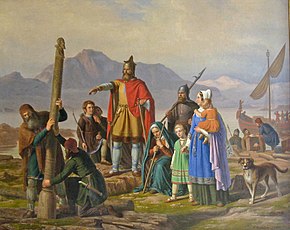
A settler is, in the broadest sense, a person who migrates to a new region to establish a permanent presence there. A settler is also called a pioneer if the land that they migrated to was previously uninhabited or sparsely populated.
Settlers come from a sedentary society, which has developed in a generally fixed geographical location, in contrast to a nomadic society, which does not have a fixed habitat and moves around seasonally with various settlements.
The process of settling land can be, and has often been, controversial: while human migration is a normal phenomenon by itself, it has not been uncommon throughout human history for settlers to have arrived in already-inhabited lands without the intention of living alongside the native population. In these cases, the conflict that arises between the settlers and the natives (or Indigenous peoples) may result in the dispossession of the latter within the contested territory, usually violently.[1] While settlers can act independently, they may receive support from the government of their country or empire or from a non-governmental organization as part of a larger campaign. The lifestyle of a native population is often disturbed or destroyed if they come into contact with a settler population that seeks to replace them.[2]
- ^ Wolfe, Patrick (December 2006). "Settler colonialism and the elimination of the native". Journal of Genocide Research. 8 (4): 387–409. doi:10.1080/14623520601056240. S2CID 143873621.
- ^ Olson, Pamela (2013). Fast Times in Palestine. Berkeley, California: Seal Press. p. 35. ISBN 978-1-580-05483-6.